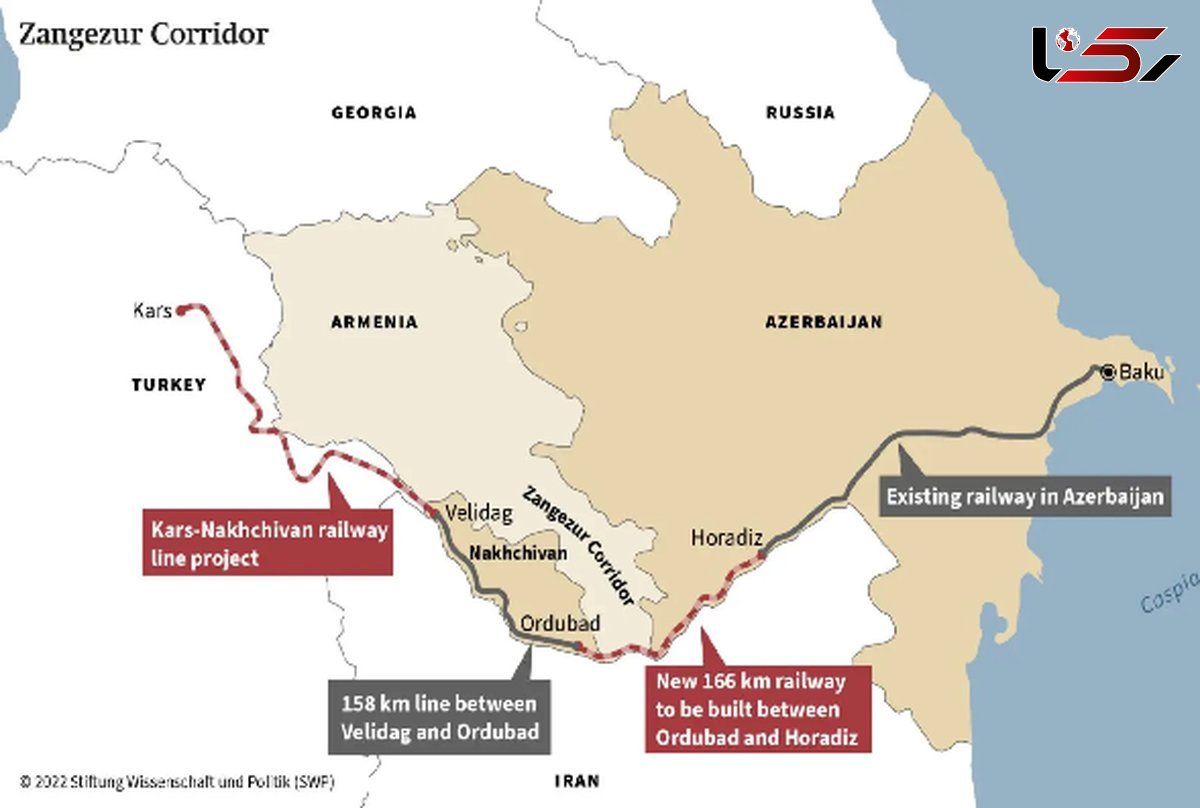Iran’s Outlook on the Zangezur Corridor; Proposed Actions
Rokna Political ِDesk: In international conventions, changes to international borders are not accepted. However, alterations within a country that directly target the legal interests and access rights of a third country, effectively cutting them off, present a different matter. Although such a scenario is not explicitly covered by international law, Iran, by claiming the need for a route for peaceful commercial exchanges, may be able to attract some neutral countries to its side.

Lotfali Bakhshi wrote in a note published in Donya-e-Eqtesad newspaper: Over the years, the majority of Iran’s trade with European countries and the Transcaucasus has been conducted via land routes passing through Armenia. The recent agreement between Azerbaijan and Armenia at the White House in the presence of Trump may disrupt this traditional access route for Iran to Europe.
By circumventing this path for Iran’s imports and exports, costs and transit times will increase, causing significant detriment to Iran in both respects. The issue is not limited to economic losses; the strengthening of the Pan-Turkic world and its land connection also poses a potential future threat of hostility toward Iran.
Although, due to Iran’s threats, Azerbaijan and Armenia have acted cautiously regarding this corridor, a third, powerful, intelligent, and opportunistic country seized the largest share of this strategic passage at a critical moment, becoming the undisputed master of the route. The two countries had no choice but to accept this “new overlord.” Beyond substantial material gains for the United States, Trump’s move grants strategic control over this vitally important commercial passage, facilitating access to the Transcaucasus and countries beyond the Caspian Sea, ending Russia’s century-long dominance over these regions.
Now, Iran is left with multiple parties involved in this matter:
-
On one side, a powerful and greedy country, two compliant states, a powerless Russia, and silent spectators.
-
On the other side, Iran, possessing numerous international legal cases only in the international arena.
What can be done?
International conventions do not accept changes to international borders; however, changes within a country that directly impair the legal interests and access rights of a third country exist in a gray area. Although not explicitly addressed in international law, Iran may, by asserting the necessity of a route for peaceful commercial exchanges, succeed in drawing some neutral countries to its side and raising global public awareness about this injustice to Iran’s future.
Forming a legal-diplomatic working group and inviting international law professors, international lawyers, and experienced Iranian diplomats to compile a legal case (including arguments on the violation of access rights, interpretation of trilateral declarations, and customary and treaty law provisions) is essential.
The permission for this corridor’s passage stems from Armenia’s sovereignty over its territory; however, it is certainly possible that, at several points along this route, “overpasses or underpasses” could be constructed, maintaining minimal access for land connection between Iran and Armenia.
The issue of Iran’s overpass and underpass access above or below this corridor could be one of Iran’s demands in negotiations with the United States. The demand for “overpass/underpass passages” as a condition for agreement with the relevant parties (the U.S./Azerbaijan/Armenia) to create several crossing points preserving the direct Iran-Armenia connection is a legitimate request.
The positions of the involved countries regarding such a request are estimated as follows:
-
Armenia will most likely fully agree to Iran’s access issue, as it would preserve land connections with Iran and retain the right to transit Iranian goods.
-
Trump’s stance depends heavily on relations with Iran and how Iran presents this request. Importantly, Trump could be reminded that his peace agreement should not and cannot inflict substantial harm on a third country; such a claim could endanger his Nobel Peace Prize.
-
Azerbaijan and Turkey will likely oppose but may not express their objections openly.
-
Russia has significant interests in preserving this route for Iran, but this depends on Putin’s dealings with Trump concerning Ukraine.
Additional matters requiring attention and action include:
-
Multilateral diplomacy: Consulting with Armenia and issuing joint statements requesting cooperative efforts to internationalize the issue beyond a bilateral dispute, thereby increasing political pressure on third parties. Georgia may also join this group due to its transit interests in Iranian goods.
-
Employing soft diplomacy discreetly and without rhetoric, relying on international principles and friendly commercial relations between countries.
-
Activating public diplomacy: Preparing a documented and concise report in English to send to international institutions, media outlets, and neutral research centers to raise global public sensitivity.
-
Protests by Iranian Armenians over the severing of easy land access routes to Armenia for visiting relatives, and possibly protests by Armenian citizens regarding this matter.
Send Comments